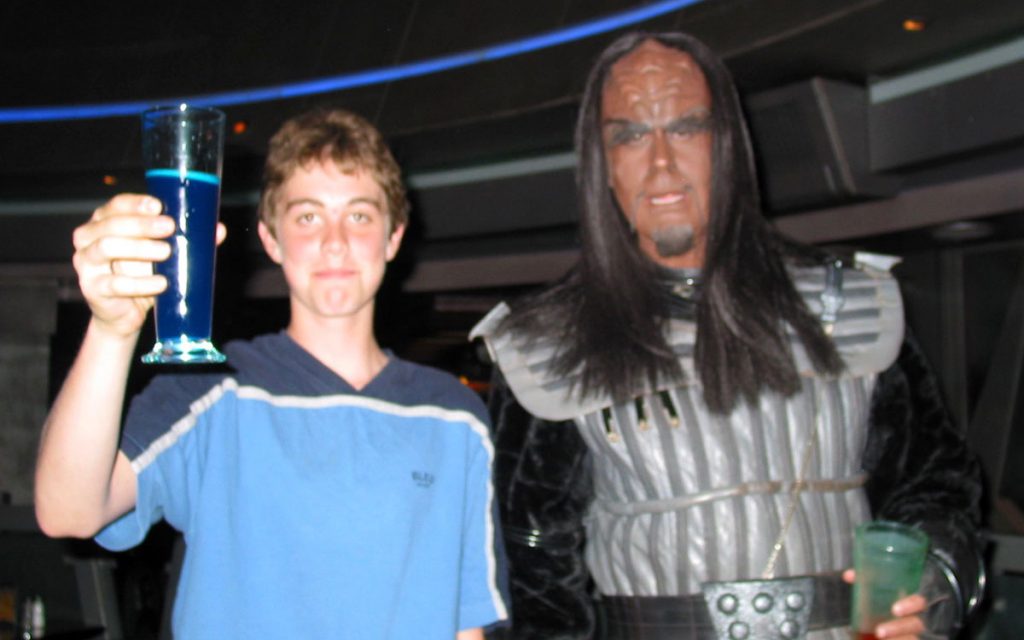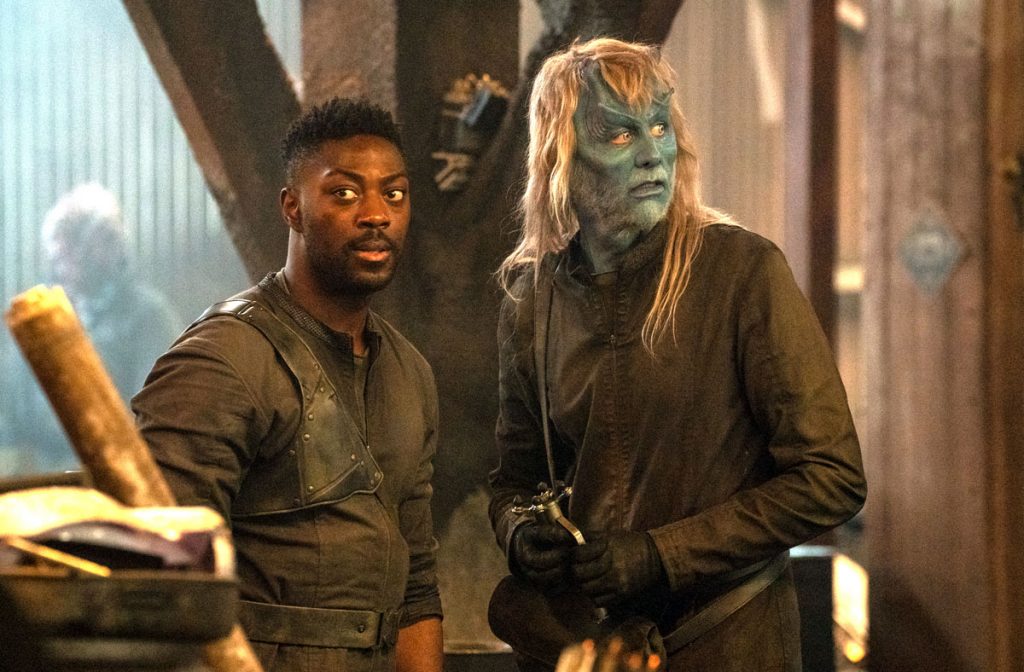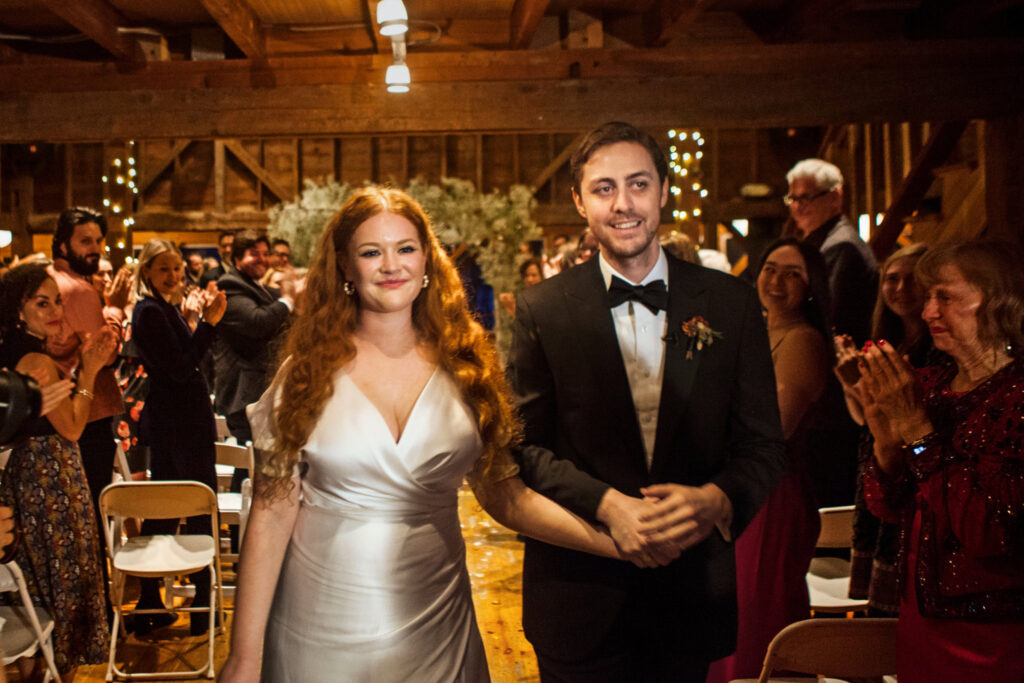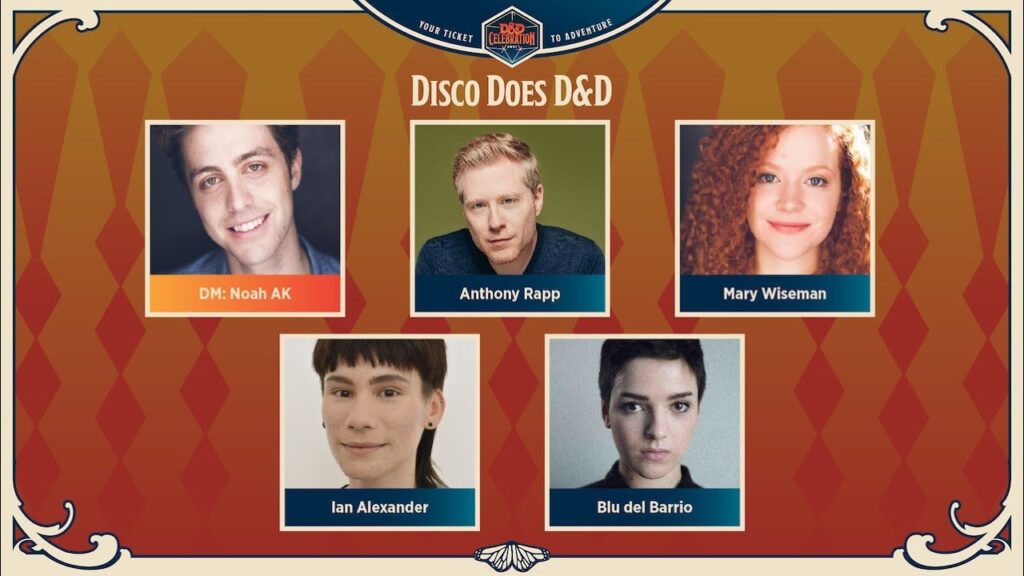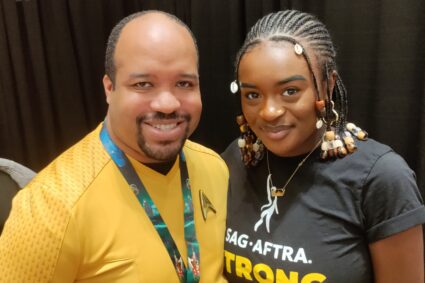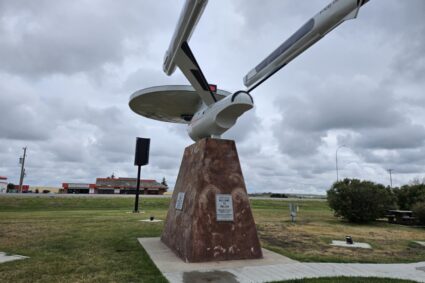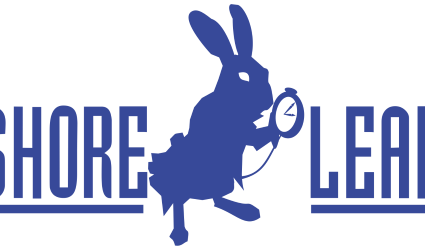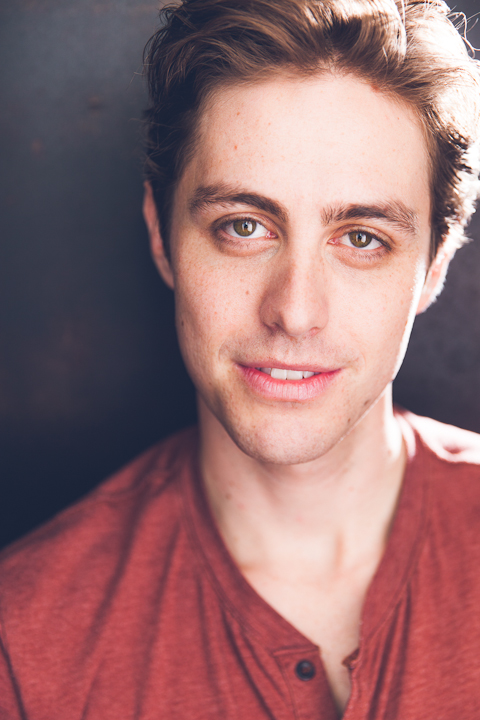
Our guest today has been boldly going where few have gone before. As a young man he has often attended Star Trek adventures with his mother, just like me. And later in life, he and his future wife were classmates at the Juilliard School Drama Division, along with Discovery cast member Mary Chieffo. Since then he has played the Andorian “Ryn” during the third season of Star Trek Discovery.
He has bred this amazing D&D campaign for Discovery cast members, which we will talk about later. He and his wife Mary Wiseman, from discovery has just celebrated their third wedding anniversary not too long ago. And just a few days ago, he has launched a Kickstarter for his new short film “Type 1”, which in under 24 hours has surpassed its goal of $25,000. And as of this article it has more than doubled, over $66,000.
Friends of the fleet. Ladies and gentlemen, we have Noah Averbach-Katz
Click HERE to DONATE to Type 1 – his short film on Kickstarter!
Hello. Thank you for having me, Dean. Boy. When you put it all like that I’m been busy man.
Well, I have to tell you something. Before we start our amazing talk. We actually met at the Creation New Jersey convention back in the fall. And the craziest thing is we were talking about, I was talking about Starship Farragut and you actually wrote on a picture which I have here.
Let me see.
“From helmsmen to navigator” you wrote that to me!
Did I spell anything wrong in there?
No, you got everything right. And the funny thing is, I told you one day, I would like to interview and here we are.
There we go. There we go. Amazing. That is fantastic. Dean, thank you, it is me.
So first, we got to talk about “Type 1” it reached its $25,000 goal within a day. I want you to tell us what led for you to write this amazing short story we’re about to see, gosh,
Boy, so a lot of different things. I was doing a play in Baltimore. And there was an amazing deaf actor in this show, Michelle Edmonds. I was just struck, you know, kind of getting she sort of was very gracious and sort of letting us into the little deaf community that was sort of around the show. And then that sort of gave a window to the larger deaf community. And it just made me think about the disabled community at large, and also, the diabetes community. And, you know, one of the things I was struck with was how they the deaf community was really had a real community behind it, you know. They all sort of had, they sort of, you know, all all understood the same things about their community. And the diabetes community is so fractured, you know, there aren’t any single places where everybody congregates, where everybody understands the same things. And even with the internet, there’s little pockets around here. And along with that, there’s not a lot of diabetes, and especially type one diabetes media out there for people to sort of congregate around to flock to see themselves in. And when it has been in media, it has been sort of as a plot point.
You know, in Con-Air, it’s a plot point in The Walking Dead. It’s a plot point, and it’s changed slowly, you know, there are better representations. A lot of the time those representations feel very instructive in a way that is very much not for the Type 1 crowd, it’s for people who want to learn about it. And so I was thinking, I was in this play, I had like a large amount of downtime on stage or it’s just laying on the floor because I was playing a dog thinking, “You know, what, what could be something that sort of bridges this gap that is really something that that type one folks or diabetic folks could really see themselves in but that also isn’t so that does and alienate people who aren’t Type 1 and then just sort of came up with this idea. You know, because there’s this family joke with Mary’s family, they’re obsessed with sort of zombie apocalypse. And I’m like, “Well, look guys, zombies are coming. I’m the guy who’s like, I’ll hold them off. Like, I know, I’m gonna die here, but like, I’m screwed, you know?” And I thought, what can I maybe like develop this into a short, then that was in February of 2020. And then March of 2020, you know, I was in New York, and everything sort of shutdown. The reality of not being able to acquire, you know, both for diabetics and anybody who needed prescription medication and not be able to acquire the things you need to become very real.
And so trapped in this tiny little apartment, we’re at the time I just over a few days, I just put the story down on paper. And that was kind of it. And this story of a Type 1 diabetic man and his wife sort of leaving behind a some sort of disaster, searching for what they hope is like a cache of insulin so that they can keep going became Type 1.
That is amazing to hear about this and it’s a great story. And to let you know, I’m a type two diabetic. I just became a diabetic, surprisingly, at the start of the pandemic.
Oh, well, welcome to The Club.
When I read about your tale I was like, “This is something that’s never been told before. And I’m glad that you became the voice about it.” And when I read, you became a T1D for 20 years. You are right that so often, it’s usually used as a plot point, or it’s almost like the killer did it, because he had type one. And I want you to talk about how are you able to take this story that sometimes in the media world was a negative or negative plot point, and decided to give it some positive aspects for a change?
What I’m sort of hoping to do with the movie alongside just like telling a really compelling and interesting and new story is also sort of tie it into the insulin pricing crisis in the United States, which affects both type 1s and type 2s, who use liquid insulin, and just sort of give people a window into what it really could be like to ration insulin. What it could barely feel like to not know where you’re going to get the insulin that you need to stay alive. And again, doing that in a way that is traumatized, that is a bit removed from our day to day reality. So like a show like Star Trek or other sort of sci fi shows, if it’s just removed a little bit, it feels like you can step into it a little bit more, and not feel like you’re being bombarded or talk to, in a way trying to trick people into feeling like, oh, I can really put myself in this situation.
And so that was sort of my thought when it came to trying to, you know, tell this story, that it’s not just about people walking through a woods or just telling a story, if there is that sort of meaning to it of giving folks who either have had to go through insulin rationing, who haven’t known where their next dose of insulin is going to come from, or for folks like me, who have been very privileged and lucky, but still live with the fear that you are one or two steps wrong, from mistakes or accidents or just some bad luck, or, you know, things like in the world that are completely out of your control from not having access to insulin anymore and putting that out there.
So, folks who live with this and have lived with it really can see themselves in it. And folks who are new to it can feel like immediately connected to this kind of story.
And from the support of your Kickstarter, the support has really show that this is the first time I actually had to do this in an interview. I want to share some statistics with our readers with our listeners about type one diabetes. So here folks, here are some information you need to know. (In 2019, 37.3 million Americans or 11.3% of the population has diabetes. Nearly 1.9 million have Type 1 including about 244,000 children in adolescence. It is the seventh leading cause of death.)
You know, it’s interesting because both type one and type two, almost everybody knows somebody who is affected by it, you know, but at the same time, it’s such both type 1 and type 2. And personally, I don’t really like to speak on type two, not because it’s, there’s anything wrong with that, but just, it’s not the disease I do. So I don’t really like to speak for them, for people with type two, like yourself, but just in general, from my experience of type 1, it’s a complicated disease, it can also be such a stigmatized disease as well, that it can feel very difficult for people who, who aren’t diabetic, to ask for information, to get information to understand what is really going on there and to sort of sift through all of the all of the you know, all of the baggage, all of the things that you just inherently think are true, through inaccurate, or unhelpful portrayals that you may have seen, or tropes.
Hopefully, this will give just a fresh look, you know, maybe it might not say, “Oh, I understand what it’s like to be a diabetic now”, but it will say, “Okay, maybe the things that I thought I knew about diabetes, or about type one diabetes, maybe those aren’t actually super accurate,” and it’s okay to reevaluate them. One of the things I’ve tried to make myself tried to do is make myself super available to people to ask questions to say, I don’t really understand this, what is this thing? Can you tell me what this is? And so, you know, hopefully, along with this movie will come with that feeling of like, I have further questions. And I know where to go after this as well.
Along the same lines, what are some of the most stigmas that type 1 or even type 2 had to deal with?
I think in general, when you talk about the word “diabetes”, the sort of clumping in type one and type two diabetics, I think there’s a lot of shame and blame around healthiness, weight, choices which one are not necessarily accurate and two are definitely not helpful when it comes to treating people with the disease. For people to get help with the disease, any sort of baggage or shame or stigmas like that, it just doesn’t help people to live healthy lives. It also, even within the medical profession, any kind of judgment or stigma as well, that is brought to the table as well, it just doesn’t help people to stay healthy.
For type ones. There’s less of that classic, like “stigmas” attached, and more of a lot of confusion, which can lead to people making wrong assumptions about what we need to stay alive. Whether that’s through saying, “oh, you can’t eat that you can’t do this,” which is just a misunderstanding. Or if that’s from people not understanding what to do in an emergency situation, you hear these horror stories of people giving insulin when they don’t need any more, which can obviously be very dangerous. And it sort of extends to like the greater disability community, and how disabled people are as a whole are treated in the United States.
And something like COVID has really made it very clear to a lot of disabled people that a lot of individuals and a lot of systems don’t care about whether they live or die. And that’s a really challenging thing to have to grapple with. I’ve experienced that and I know, other diabetics and a lot of disabled people have experienced that. That’s something that comes up as well. And then above all, is healthcare and people’s access to health care, and sort of the sway that the pharmaceutical industry has particularly over insulin. Again, this extends to so many different quarter corners of the disabled community.
And in terms of statistic, one in four Americans are disabled. It’s a massive, massive community who is affected by these things. It’s not, you know, this small little niche group who’s raising their hand and whatever, it’s 1/4 of Americans.
It is indeed You’re right about that and we still got a long way to go, but I have a feeling with your film and the knowledge that we carry, we’re gonna get there, we’re gonna get there.
Well, you know, my hope with something like this is like, it starts a conversation and I’m in conversations with disabled films and disabled creators that have come before me, you know, so hopefully, this is just another step on the road. With a film like CODA getting nominated for the Oscars, is super exciting. I owe a huge amount of those films and a ton of other disabled, forward films and especially disabled creators out there who have done a lot of work educating people and, and have done a lot of labor, when it comes to really pushing the conversation away from sort of, basically Victorian era ideals about what it means to be disabled into the 21st Century. Are we in the 22nd century? I don’t know where we are the future? How about that? I watched you make Star Trek. So I’m like, I don’t know what to say.
You and me both we are Star Trek people what can I say. And speaking of Star Trek, how did you know that the wonderful Anthony Rapp was the right person to direct this piece and help you tell this tale?
Oh, man, well, it just so synergistic, but it just couldn’t be more perfect. You know, I wrote this script, Mary’s really excited about it. I’m really excited about it. My little community is really excited about it. And I start playing D&D with Anthony, and we hit it off. I’m playing in his home game, and we just get to spend all this time together during season three. He was shadowing directors on Discovery and shooting some of his own stuff. I think he shot some scenes with Mary shadowing people like Jonathan Frakes. Just like these incredible directors, and he went to goddamn film school
I have to completely out myself. I love TV and movies and stuff but I don’t know anything about film. I don’t know how to make a picture good look good. It was just like he has this experience and I was very nervous to bring the script to him. Of course, wanted him to say yes, but it’s such a great project for him to have all these people. He’s not coming in blind to this. He knows me and Mary, and some of the other crew really well. To kind of give him a calling card and say “This guy’s a director!” you know what I mean? My hope is people are gonna see this movie and then he’ll just start directing. And then he’ll put me in his stuff.
Absolutely especially it worked for LeVar Burton, Robert Duncan McNeill, Jonathan Frakes and Roxann Dawson.
I know there is such an incredible legacy of Actors-to-Directors pipeline in Trek. And it’s tougher now because the whole system has changed since it was back in the aughts and the 90s. To have that come out of this would be very special to me as we’re going through Trek history. He originally tutored under Jonathan Frakes and then he made this movie “Type 1” before directing you know what I mean? If I can get my little insert in Memory Alpha, I’ll be happy.
So let’s go back to feels like an eternity but was only three days ago when you launched a Kickstarter and exploded like lightning, and you reach your goal in less than 24 hours….
I’ll tell you what I mean, we reached our we reach our initial goal in under eight hours!
Eight hours! What went through your mind is this number and it’s not even a day?
I don’t know, honestly. I’m still in the middle of it, it’s still day three and I haven’t really processed yet. It hasn’t really come completely because I’m still trying to move forward but it’s just been amazing. It’s been gratifying, it’s just been a really special experience. And, part of me is, of course, shocked and amazed, but another part of me is, in a good way, not surprised.
Over the last two years, since I was on Trek, and have been inside because of COVID, and spending a lot of time on the internet and getting to sort of meet and, and community communicate with all these people in all these really cool communities. It’s not a surprise to me that these amazing communities have showed up. It just is such a reminder to me about how good community is and how we all support each other and how helping each other out really just is so amazing. I’m still I’m still in shock.
The whole thing was that I started texting people and I said, “Oh, shit, I didn’t really think this through. I’m gonna have to actually make this fucking movie now. I should have thought about that before I started.”
Yeah, especially in the world of Kickstarter, it could be hit or miss but yours is bonafide & certified. I’m going to take your way back in a bit. When I saw the video of you as a fellow attendee and that gradual transition to Discovery, I realized “Oh my gosh, that is me because I went from a fan of myself to be in a fan film to being in an audio series.” I like you to talk about the earliest moment you found out about the final frontier.
It’s funny, Dean, I don’t really remember first glimpse because I feel like it wasn’t like, “Oh, now you’re starting” was like, “this is on, you’re doing this.” You know what I mean? It was just like, it was just a part of what I did, going to conventions, there wasn’t really a conversation “Do you want to go? It was like, “which friend?” Do you want to invite in? Are you ready to leave?” Yeah, you know what I mean? Wasn’t like, what do you want to watch? It’s like, we’re watching Voyager.
So I don’t really have like a first moment. It’s more just like, it was like a birthright. I think that it was just given to me, passed down from generation to generation.
And I believe it was your mother who introduced you to the trek?
Oh, yes. Yes, yes. Yes.
Just like my mother, my mom took me to my very first convention, which is now 27 years ago. Going ever since including this weekend.
Wow. Wow. You’re hooked, man. I get it. I get it.
Do you remember as an attendee who were your favorite guests to see?
Well, I love seeing Robert Picardo. I remember we saw like him. And I want to say, I can’t remember who it was with. I’m sure somebody can actually tweet at me and tell me that, but I’m sure that I saw him to like opera performance stuff at the basement of a Hilton in Sacramento. And it was just, it’s just so fun, over the top and goofy and exciting. I just remember him like really vividly because he just has such a big personality at these things. It’s so fun when somebody really takes center stage and it’s just like, all over the place in a really fun way. And of course, Frakes is amazing and Patrick Stewart is amazing.
So let me ask fan to fan. What is your favorite movie, series and character? Asides from Discovery
Favorite movie, boy? Here’s the thing. I grew up in a very strange time for Star Trek, like I hit. I hit, you know, 11, 12 like, peak sort of consuming TV but not really in your control yet. You know, you can say I want to watch TV, but you still have to get approved of what you’re watching. the movie that I have with this is a wrong opinion. The movie that I love the most in my childhood was Nemesis. I shouldn’t. It’s wrong, but I can’t stop me. And that also extends to Enterprise, that was the series that I grew up episode to episode with, and sort of have the most sort of deepest, I love them all.
I also love Enterprise, because it’s all out there. You know, the good, the bad, the ugly, the great. It’s all there. You can’t look away. You can’t really cherry pick like you can cherry pick Next Gen and say, “These are the great episodes. We just don’t talk about these 45 episodes nobody mentioned, you can’t do that with Enterprise, so I love that about it.
Favorite character is tough. Obviously, Tilly is my favorite character of all time. Love, love Tilly! Outside of that I really love Troi growing up, because my mom was a therapist. Then getting to meet Marina was very cool. So that’s been great. But I do think my current sort of go is Shran because I got so invested in him as I was sort of prepping for Ryn on Discovery.
Well, that’s a great segue to my next question, how did you prepare for the role of Ryn? And then tell us about working with your wife, with David, with this stellar cast for season three?
Yeah, I basically just watched all of Shran, that’s what I did. you know, his prep. I watched the other the TOS episode with this sort of fake Andorian. In terms of prep, that’s really what there was at the time was just this performance. I just tried to watch it and think a lot about the other like Star Trek races, species, whatever. It’s very clear what they are about, what to cling on. What the Vulcans are about. I think a lot of that comes since they’ve been around forever in a good way, but like early Star Trek is so didactic. it is this trait of humanity or whatever.
In the end, the Andorian thing is not really clear. Are they warriors? Are they double crossers, or they just like heroes, but that doesn’t really work with Suzy Platt, you know what I mean? I thought a lot about it. What I really thought was we’re sort of moved past every species race is didactic it is this part of humanity. And really, what I think is going on is like, there’s something they present and there’s something they cover, right.
So like Vulcans present logic, but they cover their crazy emotions. And Klingons present honor and blood lust, but they are about tradition and doing the right thing or whatnot. When I say Andorians, what I am actually saying is just Jeffrey Combs. What he was doing was sort of putting out like this very cocky, surefooted badass front covering this really deep, well of emotional sensitivity. He’s so sensitive. He’s so hurt. He’s so wounded when that veneer drops as his arc sort of progresses. I kept that in mind because I didn’t really know Ryn’s arc. I didn’t know what was going to happen to him. I didn’t know if he was going to be in one episode. I knew he was gonna die because I’ve watched enough Star Trek that I know when people are gonna die. I didn’t know how long
I actually shed tears when he died to be honest with you.
So, did my mom. And I just kept that in mind as I was starting to build the character. Being on set was amazing. I got to do so many different amazing things, which is so rare for Star Trek to get to have a three-episode arc. Usually it’s like a one-episode arc especially in the newer stuff. You’re there for a season or you’re there for two seconds. To get to do something in between was amazing.
I got to work with so many different people, you know, I got to do early stuff. It was just me and David, you know, and so it was so much fun and such a great bonding experience. And he’s such an amazing guy and leader and actor, just a really incredible actor to get to like have my first days on set with just him. It was sort of his first time where he was the guy on set, you know, because they had shot in Iceland.
And that was a very cool, but very disjointed experience. When he got back to here, you know, he had done some stuff already but like this was these first days where there was nobody else from the cast there. This was like his time. It was great to sort of learn from him and watch how he led his show and led the extras and led the set. It was it was such an amazing learning experience and he was so gracious about it. We just had a great time.
And getting to work with Mary was incredible, because we hadn’t worked since Julliard together. And, she’s just fucking was so good. I was like, “Oh shit, you’re really good at this.” I’ve walked in the first time. And she was so relaxed. It was totally her said totally her thing. And I was like, I need to step up my fucking game right now that she’s stomping on me and it’s embarrassing but I loved it. I really couldn’t have asked for anything more. And, you want to live forever and everything you do, but that’s not really how the world works.
So, considering what I got to do, I actually feel very lucky that I got to get in have this amazing little story arc and get out before a few people got annoyed, which is great, because that means that I then get to go and hang out in the community without anybody being like, we didn’t actually like you that much. You wore you welcome out, you know what I mean?
And speaking of you and Mary, how did you to celebrate your wedding anniversary?
Well, she’s working on a play right now in New York, called “At the Wedding” at LCT3 and she’s like the lead. She’s on stage the entire time, she’s exhausted. I bought her an at home massage. I sat on the couch and relax and she got a massage. It was exactly what both of us needed.
Well, that’s wonderful to hear. Now we got to talk about this Disco Does D&D campaign. So you got to tell us all about because it was part of stretch goal number one. Now it’s part of stretch goal number two, which stretch goal number one was $43,000 hours, it’s gone. Now its $65,000!
We started playing D&D is a way to stay connected. When we were shooting the pandemic, it was all pre-vaccine. And we were super, super trying to be as safe as possible. And we didn’t spend any time in the same room together. At this point in pandemic arc, we were sick of zoom drinks. Nobody wanted to zoom drink after a week of work, right. So, this became a way for us to hang out. And it was also a way for me to get to know Ian and Blu who I hadn’t really spent any time with, and who are now considered like really good friends, which has been amazing.
Anthony would post these updates, just sort of writing out what happened at the campaign. And people got really invested in our little story. We were all very invested in it was this really amazing place to sort of escape to and people would always keep streaming it and ask “Are you streaming? Are you streaming it?” And well honestly, we don’t want to stream this. We need this to be for us. In this offseason, Blu really was like “I want to stream this GD game.” and I was like, “I mean, you don’t have to tell me twice.” We got it up on Twitch and it’s just been so much fun.
We are we’re doing almost like a sort of college campaign which has been very fun. Based off my original alma mater, UC Santa Cruz, I’ve renamed it Rio Del Mar which has been really fun. Ian never went to college and Blu into theater college. I’m trying to give them both the real classic college experience.
So for the first stretch goal, basically, we’re going to do a one shot like a one off thing, where I’m going to basically put out a Google form, and accept submissions about what people think this one shot should be. They can tell me who the monster should be, what the settings should be, what Anthony’s character name should be. It’s just going to be absolute goofy madness. I’m going to go through and pick like the best of the worst, I guess. Then we’re going to try and make something out of it. And then for this stretch goal that’s currently running.
If we crack 65k, then Anthony will DM a one shot for me, Blu and Ian and maybe a friend or two. I’m really looking forward to that because I played D&D with him sort of off stream in his home game, where he DMs and I’ve just been having so much fun. I just really am excited for the community to get to see him go to work, which is going to be great.
Brilliant. Since I’ve never played D&D, what advice would you give me to start?
That’s a great question. To start, I would say there’s two things you can do. If you have a friend who’s very into D&D, you can just say, “I want to play”. I guarantee if that friend is very into D&D, they’ll make it happen. It is this thing where it’s like the Wesley goggles, where he’s putting the little spiny disc in the hoop.
If you don’t have a friend who’s into it, I would suggest checking out a podcast or like a stream. Critical role is a great thing. It’s a little daunting at first but if you can stick with it for a while, you’ll get into it. There are tons of other podcasts out there, and those will suck you in with the story. And then you’ll start to pick up on how to play and you’ll learn to try and figure it out. And, suddenly, you’ll kind of understand it without even noticing.
My last question to you is this, what would you say to your fans who not only supported your amazing career so far, but also “Type 1”?
I would say a massive thank you. I’m just so grateful. I don’t really take it lightly when people decide to give their money or even, share on their social media about something like this, that every single one, regardless of how much or how whatever, it just means a lot. I just really get understanding putting yourself out there and participating. It’s not just the money, it’s also really participating in something meaningful. And every one of those interactions, reaffirms that this is something that is worth doing.
So I would just say a huge thank you. And if you haven’t donated yet, and you’re interested, check out the Kickstarter, you can find it all over the internet, wherever. And see if it speaks to you, you know, and if it does, then then throw some money. We have some cool rewards if you’re interested in those. And if it doesn’t speak to you. That’s cool, too. It will though. That’s my bet.
Where can people find you if they want to follow your career?
You can find me on Twitter at N_A_K. You can find me personally on Twitch. I’m the Type1Trekkie on Twitch. You can find Disco_Does_D&D on Twitch.
You can also find him on his official website: https://www.noahak.com/
